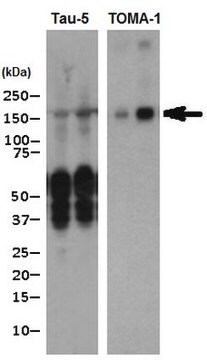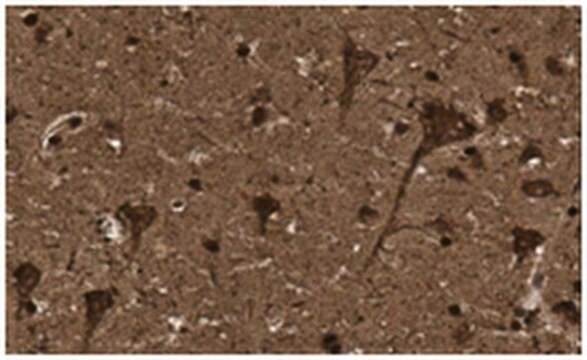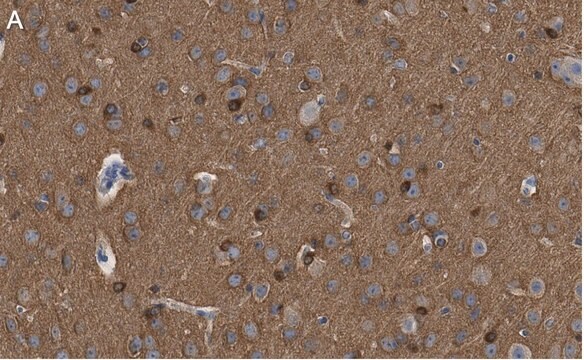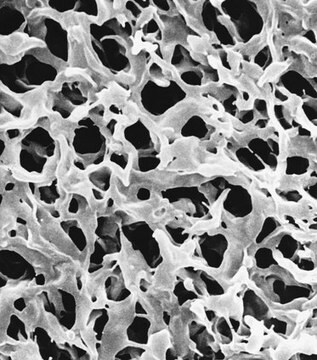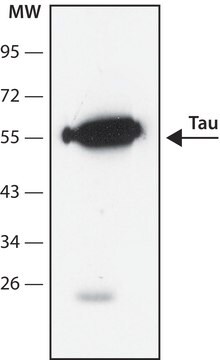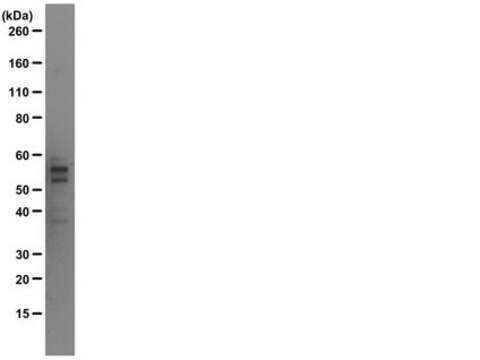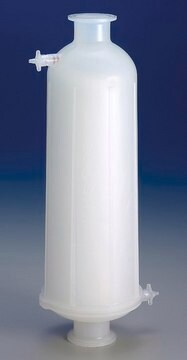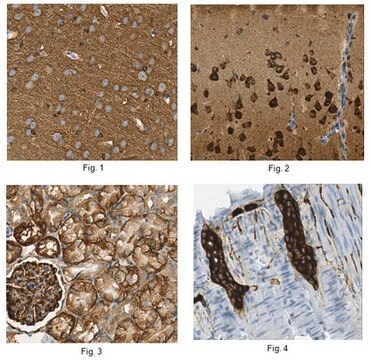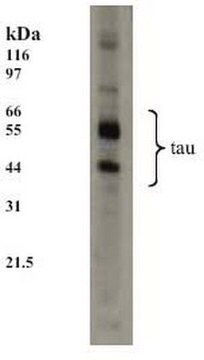ABN454-I
Anti-Tau (T22) Antibody, oligomeric
from rabbit, purified by affinity chromatography
Synonyme(s) :
Microtubule-associated protein tau oligomer, Tau oligomer, PHF-tau oligomer, Paired helical filament-tau oligomer, Neurofibrillary tangle protein oligomer
About This Item
Produits recommandés
Source biologique
rabbit
Niveau de qualité
Forme d'anticorps
affinity isolated antibody
Type de produit anticorps
primary antibodies
Clone
polyclonal
Produit purifié par
affinity chromatography
Espèces réactives
human
Technique(s)
dot blot: suitable
immunofluorescence: suitable
immunohistochemistry: suitable
western blot: suitable
Numéro d'accès NCBI
Numéro d'accès UniProt
Conditions d'expédition
ambient
Modification post-traductionnelle de la cible
unmodified
Informations sur le gène
human ... MAPT(4137)
Description générale
Spécificité
Immunogène
Application
Neuroscience
Dot Blot Analysis: A representative lot detected human P301S tau oligomers in hippocampal dentate gyrus (DG) and medial entorhinal cortex (MEC) tissue lysates from PS19 transgenic mice. Daily N-SMase Inhibitor GW4869 i.p. injection reduced tau oligomer accumulation in DG, but not MEC (Asai, H., et al. (2015). Nat. Neurosci. 18(11):1584-1593).
Dot Blot Analysis: A representative lot detected increased tau oligomers formation in Alzheimer′s diseased (AD) as well as in aged non-AD human medial temporal gyrus tissue lysates (Blair, L.J., et al. (2013). J. Clin. Invest. 123(10):4158-4169).
Immunohistochemistry Analysis: A representative lot detected human tau oligomers formation in paraffin-embedded striatal sections of Huntington s diseased brains (Vuono, R., et al. (2015). Brain. 138(Pt 7):1907-1918).
Immunohistochemistry Analysis: A representative lot detected increased human tau P301L mutant oligomers formation in CA3 region of Tg4510 mice following FKBP51-expressing AAV viarl particles injection using 4% paraformaldehyde-fixed free-floating brain sections (Blair, L.J., et al. (2013). J. Clin. Invest. 123(10):4158-4169).
Immunofluorescence Analysis: A representative lot detected granule cell layer (GCL) neurons containing oligomers of virally expressed human P301L mutant tau 1 441 by fluorescent immunohistochemistry staining of brain sections from mice received recombinant viral injection to the medial entorhinal cortex (MEC) (Asai, H., et al. (2015). Nat. Neurosci. 18(11):1584-1593).
Immunofluorescence Analysis: A representative lot detected greatly enhanced tau oligomers co-localized with that of oxidative nucleic acid damage marker 8-OH(d)G in human AD brain, as well as heat stress- (HS-) induced Tau oligomers formation in the brain CA1 region of THY-Tau22 transgenic mice expressing human tau with G272V and P301S mutation by fluorescent immunohistochemistry staining of paraffin-embedded brain tissue sections (Violet, M., et al. (2015). Neurobiol. Dis. 82:540-551).
Western Blotting Analysis: A representative lot detected human P301S tau oligomers-containing exosomal fractions from PS19 transgenic mice. Dietary supplementation with CSF-1R Inhibitor PLX3397 reduced exosomal tau oligomer accumulation (Asai, H., et al. (2015). Nat. Neurosci. 18(11):1584-1593).
The unpurified antiserum (Cat. No. ABN454) is also available for dot blot, ELISA, immunofluorescence, immunohistochemistry, immunoprecipitation, neutralization, and Western blotting applications.
Qualité
Dot Blot Analysis: 2 µg/mL of this antibody detected 100 ng of in vitro generated recombinant human tau oligomers, but not tau monomer.
Description de la cible
Forme physique
Stockage et stabilité
Handling Recommendations: Upon receipt and prior to removing the cap, centrifuge the vial and gently mix the solution. Aliquot into microcentrifuge tubes and store at -20°C. Avoid repeated freeze/thaw cycles, which may damage IgG and affect product performance.
Autres remarques
Clause de non-responsabilité
Vous ne trouvez pas le bon produit ?
Essayez notre Outil de sélection de produits.
En option
Code de la classe de stockage
12 - Non Combustible Liquids
Classe de danger pour l'eau (WGK)
WGK 2
Point d'éclair (°F)
Not applicable
Point d'éclair (°C)
Not applicable
Certificats d'analyse (COA)
Recherchez un Certificats d'analyse (COA) en saisissant le numéro de lot du produit. Les numéros de lot figurent sur l'étiquette du produit après les mots "Lot" ou "Batch".
Déjà en possession de ce produit ?
Retrouvez la documentation relative aux produits que vous avez récemment achetés dans la Bibliothèque de documents.
Notre équipe de scientifiques dispose d'une expérience dans tous les secteurs de la recherche, notamment en sciences de la vie, science des matériaux, synthèse chimique, chromatographie, analyse et dans de nombreux autres domaines..
Contacter notre Service technique
